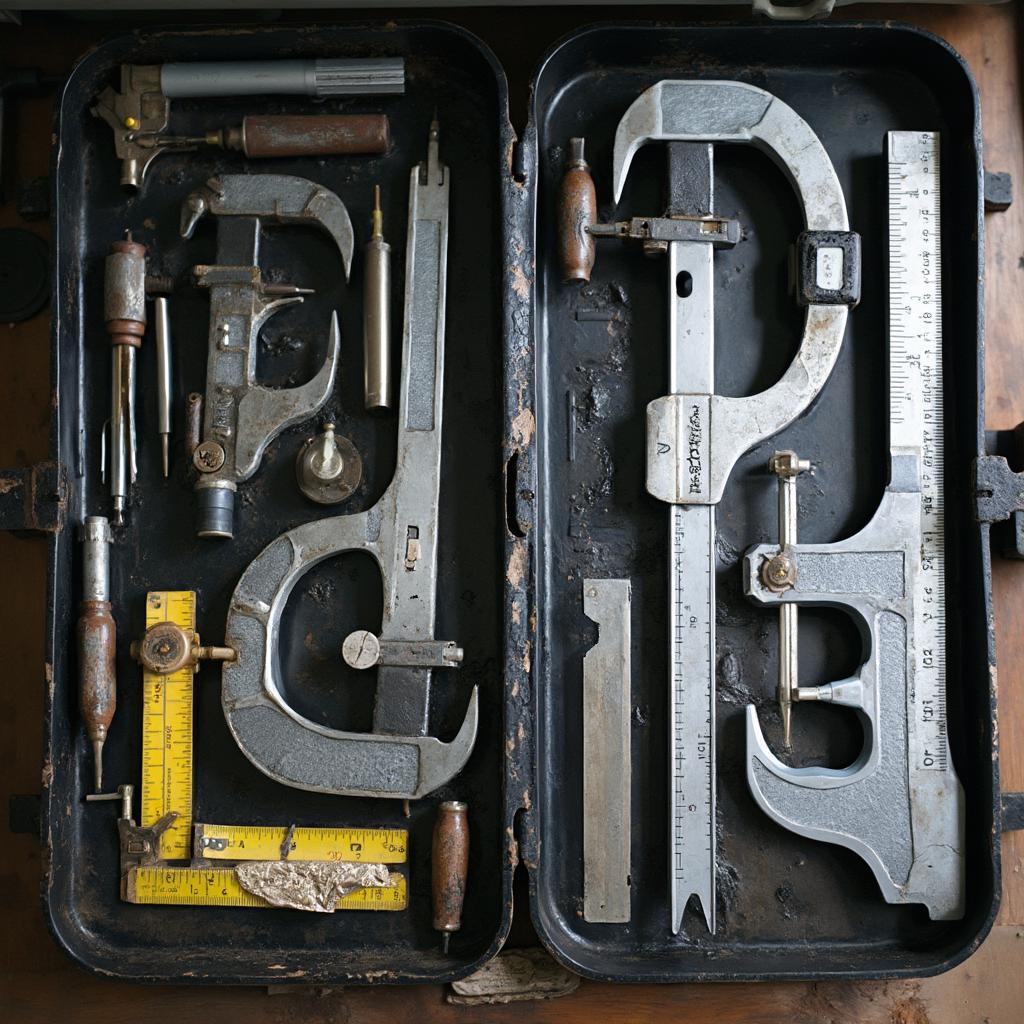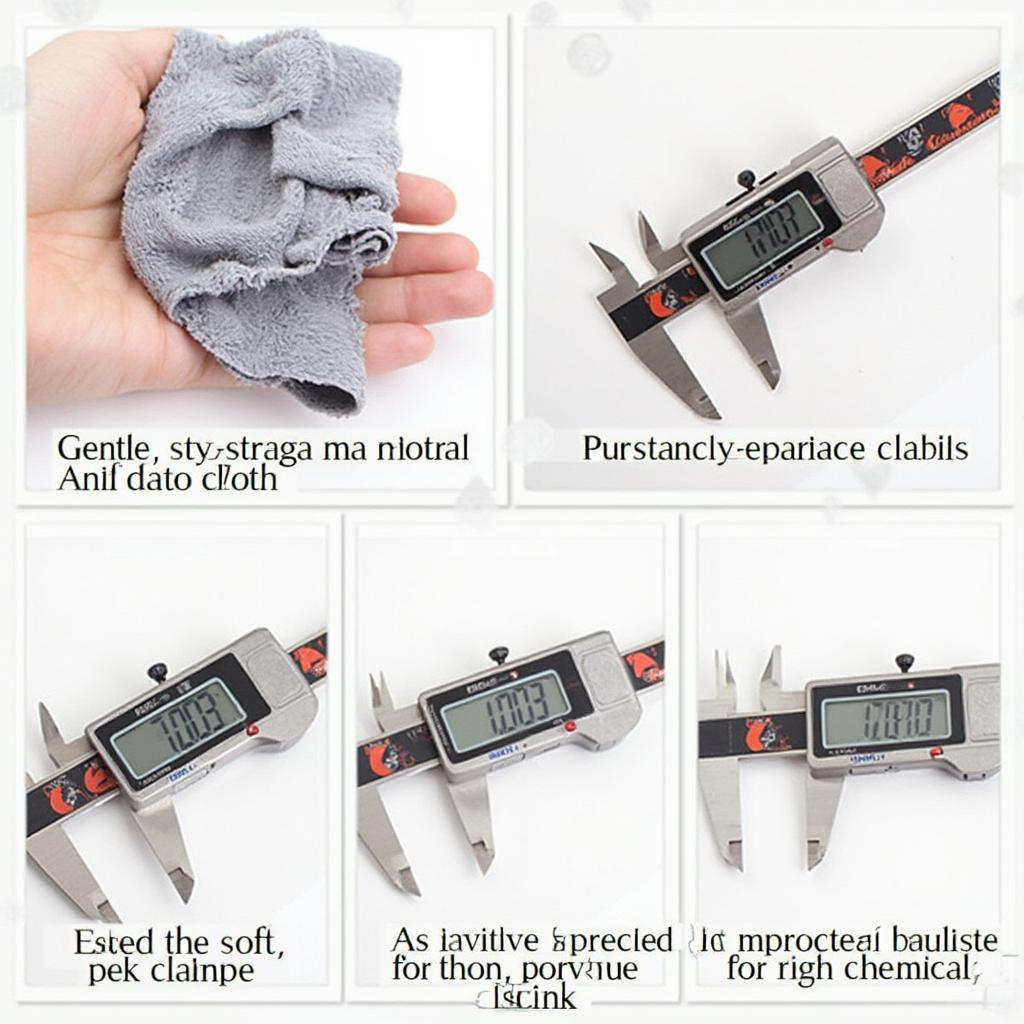Your cart is currently empty!

Tips on How to Take Good Care of Measuring Tools
Precision is paramount when it comes to measuring tools. Whether you’re a professional mechanic, a DIY enthusiast, or simply someone who relies on accurate measurements for household tasks, knowing how to properly care for your measuring tools is essential. This guide will offer invaluable Tips On How To Take Good Care Of Measuring Tools, ensuring their accuracy and longevity.  Maintaining the Accuracy of Your Measuring Tools
Maintaining the Accuracy of Your Measuring Tools
Why is Proper Care of Measuring Tools Important?
Accurate measurements are the foundation of countless projects. A slight miscalculation can lead to costly mistakes, wasted materials, and frustration. By implementing these tips on how to take good care of measuring tools, you’ll be investing in the long-term success of your endeavors.
- Maintaining Accuracy: The primary reason for proper care is to ensure the continued accuracy of your tools. Dust, debris, and even minor damage can significantly impact their precision.
- Extending Lifespan: Well-maintained tools last longer. This saves you money in the long run and ensures you always have reliable tools at your disposal.
- Improving Safety: Damaged or inaccurate tools can pose safety risks, especially in professional settings. Regular maintenance minimizes these risks.
Practical Tips on How to Take Good Care of Measuring Tools
Cleaning Your Measuring Tools
Regular cleaning is crucial. After each use, wipe down your tools with a soft, dry cloth to remove dust, dirt, and any residual materials. For tougher grime, a slightly damp cloth can be used, but ensure the tool is thoroughly dried afterward. Avoid abrasive cleaners or solvents, which can damage the tool’s surface.  Proper Cleaning Techniques for Measuring Tools
Proper Cleaning Techniques for Measuring Tools
Storing Your Measuring Tools Correctly
Proper storage is equally important. Store your tools in a clean, dry environment, preferably in a dedicated toolbox or case. This protects them from dust, moisture, and accidental damage. Keep them away from extreme temperatures, as this can affect their calibration.
Handling Your Measuring Tools with Care
Treat your measuring tools with respect. Avoid dropping them or subjecting them to undue force. When using calipers or micrometers, apply gentle pressure to prevent damage to the delicate measuring surfaces.
Calibrating Your Measuring Tools
Regular calibration is essential to maintain accuracy. The frequency of calibration depends on the tool and its usage. Consult the manufacturer’s instructions for specific recommendations. Some tools can be calibrated at home using a known standard, while others may require professional calibration.
Inspecting Your Measuring Tools
Regularly inspect your tools for any signs of damage, wear, or corrosion. Look for cracks, chips, or bent parts. If you notice any issues, address them promptly to prevent further damage and ensure continued accuracy.
Expert Insights on Measuring Tool Care
“Proper tool care isn’t just about keeping your tools shiny; it’s about ensuring the integrity of your work,” says Amelia Hernandez, a seasoned machinist with over 20 years of experience. “A well-maintained tool is a reliable tool, and reliability is everything in precision work.”
Lubricating Your Measuring Tools
Some measuring tools, particularly those with moving parts, require lubrication. Use a light, high-quality lubricant specifically designed for precision instruments. Avoid over-lubricating, as this can attract dust and debris.
“A little lubrication goes a long way,” adds David Miller, a metrologist specializing in calibration services. “Over-lubricating can actually hinder performance and attract contaminants. Use sparingly and wipe away any excess.”
Conclusion
Taking good care of your measuring tools is a small investment that yields significant returns. By following these tips on how to take good care of measuring tools, you’ll ensure their accuracy, extend their lifespan, and enhance the quality of your work. Remember, precision matters, and proper tool care is the key to achieving it.
FAQ
- How often should I clean my measuring tools?
- What type of lubricant should I use for my calipers?
- How can I tell if my measuring tool needs calibration?
- Where should I store my measuring tools?
- What should I do if I notice damage to my measuring tool?
- Why is it important to avoid abrasive cleaners on measuring tools?
- What are the potential consequences of using inaccurate measuring tools?
Common Scenarios and Questions
-
Scenario: You drop your micrometer. What should you do? Answer: Inspect it thoroughly for any visible damage. Check its calibration using a known standard. If you notice any discrepancies, get it professionally calibrated or replaced.
-
Question: Can I use WD-40 on my measuring tools? Answer: No, WD-40 is not recommended for precision measuring tools. It can attract dust and debris and may damage some materials.
Further Exploration
Explore more helpful articles on our website: career tips in social change.
Need Assistance?
Contact us via WhatsApp: +1(641)206-8880, Email: [email protected] or visit our office at 456 Pine Avenue, Toronto, ON M5V 2J4, Canada. We offer 24/7 customer support.

Leave a Reply